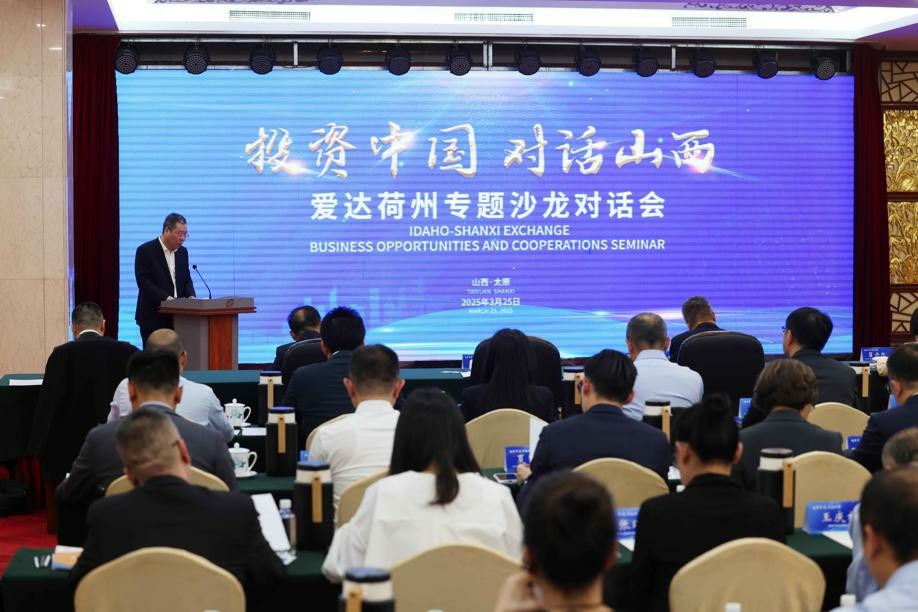All-out efforts aim to lift consumption
Action plan points nation in direction of spending-led model


China has rolled out a comprehensive set of initiatives aimed at stimulating consumer demand, with a particular emphasis on enhancing household income and expanding the national trade-in program, as the world's second-largest economy puts boosting consumption high on its policy agenda for this year.
The latest push to reignite consumption will help China remain on track to meet this year's growth target of around 5 percent in the face of escalating external uncertainties, and facilitate its long-term transition toward a more consumption-led economic model, officials and analysts said.
The general offices of the Communist Party of China Central Committee and of the State Council, China's Cabinet, jointly issued a special action plan in mid-March to address the key challenges weighing on consumer sentiment and spending power, and unleash the full potential of domestic demand as a critical driver of economic growth.
The plan came days after the two sessions, the annual meetings of the nation's top legislative and political advisory bodies, at which policymakers earlier this month set the country's deficit-to-GDP ratio at the highest level on record, to provide a much-needed boost to the tepid consumer appetite.
"The challenging employment environment and relatively low household incomes are the primary drivers behind the overall weak consumer performance," said Zhu Haibin, chief China economist at JPMorgan.
"Many consumers are hesitant to spend, even if they have savings, as they are not confident about their ability to maintain a steady income stream," Zhu said. "The incomplete social security system has led consumers to be more cautious about their spending."
Zhu pointed to the recent downturn in the real estate market as a contributing factor, noting that the decline in housing prices has had a negative wealth effect on consumers, further dampening their propensity to spend.
Li Chunlin, deputy head of the National Development and Reform Commission, said, "Unlike past consumption-related policies that primarily targeted the supply side, this new plan has placed high premiums on strengthening demand-side support and empowering consumers."
By ensuring that households have greater disposable income and face fewer financial pressures, the plan seeks to give consumers a stronger footing, more stable expectations and greater confidence in their spending power, Li added.
To this end, dedicated efforts have been outlined in the plan to promote the reasonable growth of wage-based income, including refunding unemployment insurance premiums for enterprises to keep jobs afloat and raising the minimum wage.
China's policymakers have unveiled initiatives aimed at expanding the channels for property-based income in the plan, highlighting the importance of stabilizing the stock and property markets.
"Property-based income can generate a significant wealth effect that directly boosts consumer confidence," said Wu Chaoming, deputy director of the Chasing International Economic Institute.
Households often have two distinct "accounts" when it comes to their finances. If a household earns 100,000 yuan ($13,800) through work, they may be willing to only spend 30,000 yuan of it. However, if they gain the same amount of money from stock investments, they are more likely to spend 60,000 yuan of it, Wu added.
The Chinese government announced it will increase the issuance of local government special-purpose bonds by 500 billion yuan to a total of 4.4 trillion yuan this year, toward key areas such as acquiring idle land and purchasing existing commercial housing units.
As these policy support measures continue to bear fruit, the housing markets in higher-tier cities in particular are likely to stabilize and regain their footing in the second half of the year, and the real estate sector's drag on economic performance, including consumption, is likely to diminish, according to a report by Citigroup earlier this month.
Robin Xing, chief China economist at Morgan Stanley, said a well-developed social safety net is essential for addressing the "fear to consume" mentality that has been weighing on many Chinese households.
The newly issued plan has connected consumer spending to the country's broader social goals like improving elderly care and child care support.
In light of this, China will consider setting up a system of child care subsidies. It will provide guidance to eligible regions on how to incorporate people in flexible employment, rural migrant workers and those in new types of employment that are covered by the nation's basic medical insurance for employees into the childbirth insurance program.
In 2025, the nation will also expand its financial assistance for basic medical insurance and old-age benefits for both rural and non-working urban residents. The basic pension will also be increased. "It's probably the central government's turn to try to fill the gap by either channeling dividends from state-owned capital to the social security system, or gradually shifting China's policy focus from supporting infrastructure to spending more on social welfare," Xing said.
According to the action plan, China will also intensify its support for consumer goods trade-in program, leveraging more fiscal firepower to enable local authorities to expand this initiative.
China will double ultra-long-term special treasury bonds designated for its trade-in program to 300 billion yuan this year, according to the 2025 Government Work Report.
The incentive, an expansion from last year's 150 billion yuan for the program, will cover 15 to 20 percent of the purchase price of a wider range of selected products, including midrange smartphones, home appliances and new energy vehicles.
The National Bureau of Statistics said retail sales, a major indicator of the country's consumption strength, climbed 4 percent year-on-year during the January-February period, after a 3.7 percent rise in December.
"The expanded bond issuance and enhanced trade-in incentives will provide a much-needed boost to consumption and help drive a moderate rebound in inflation," said Wang Qing, chief macroeconomic analyst at Golden Credit Rating International.
These supportive policies could help propel the year-on-year growth of total retail sales of consumer goods from 3.5 percent in 2024 to around 5.5 percent this year, Wang said. "We cannot rule out the possibility of further intensification of fiscal policies to boost consumption in the coming period," he added.
Notably, the plan emphasizes both traditional consumption sectors like housing and automobiles, alongside emerging categories such as artificial intelligence-powered products, the low-altitude economy and silver tourism.
According to the plan, the country will push ahead the development and deployment of new technologies, including autonomous driving, smart wearables, ultra-high-definition video, brain-computer interfaces, robotics and 3D printing.
The emphasis on consumption in not only home appliances and automobiles, but also in cutting-edge technologies, the low-altitude economy and silver-haired tourism, demonstrates the government's commitment to fostering a well-rounded, future-oriented consumption ecosystem, said Wang.
Xu Hongcai, deputy director of the economic policy commission at the China Association of Policy Science, said that while China's consumption has been a crucial growth engine in recent years, the lingering sluggishness in consumer spending is a clear area that requires greater attention.
Based on historical trends observed globally, once a country's per capita GDP exceeds $10,000, the contribution of consumer spending to economic growth usually exceeds 50 percent, Xu said.
As China's per capita GDP surpassed 95,700 yuan, or over $13,000 at the 2024 average exchange rate, the country's consumption contributed 44.5 percent to GDP growth — a relatively low figure for a nation that has reached this income level, Xu added.
Bridging this gap by unlocking the full potential of domestic consumption will be pivotal in shaping China's next phase of economic transformation and ensuring sustainable, balanced growth, Xu added.
wangkeju@chinadaily.com.cn
- China strengthens oversight of off-campus educational bodies
- China conducts 15th space launch this year
- Construction of China's High Energy Photon Source enters final stage
- Dongshan township guards Yangtze's ecological health
- Cross-Strait compatriots to jointly honor common ancestor
- Suggestions made by Chinese lawmakers move toward implementation





































